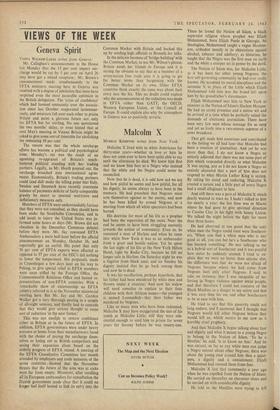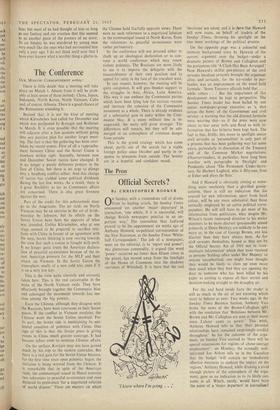Malcolm X
MURRAY KEMPTON writes from New York:
Malcolm X lived with us white Americans for thirty-nine years—whether in love or hate he does not seem ever to have been quite able to say until the afternoon he died. We knew him first and we knew him best as a Negro who insisted that the white and the Negro could never be reconciled.
Now that he is dead, it is odd how sad we are, and how pitiful he seems and how pitiful, for all his dignity, he seems always to have been in the memory. He had preached that Negroes must arm themselves against us the enemy, and now he has been killed by armed Negroes at a meeting from which all white spectators had been barred.
His doctrine for most of his life as a prophet had been the separation of the races. Near the end he seems to have been struggling unevenly towards the notion of community. Even so, he remained a man of Harlem and when he came into white New York it was as an ambassador from a great and hostile nation. Yet he spent the last night of his life at the New York Hilton Hotel, right by Radio City, because he felt no longer safe in Harlem. On Saturday night he was a fugitive from black men; and on Sunday his dignity insisted that he go back among them and now he is dead.
It was his recollection, perhaps hyperbole, that his father had been murdered by white men and thrown under a streetcar. And now his widow will need someday to explain to their four children with their African names—the youngest is named Lomumbah—that their father was murdered by Negroes.
Like so many men who have been redeemed, Malcolm X may have exaggerated the sins of his youth as Malcolm Little; still they were sub- stantial enough to send him to prison for seven years for larceny before he was twenty-one. There he found the Nation of Islam, a black separatist religion whose prophet was Elijah Muhammed, born Elijah Poole in Georgia. As theologian, Muhammed taught a vague Moslem- ism, orthodox mainly in its abjurations against alcohol, tobacco and adultery; as historian, he taught that the Negro was the first man on earth and the white a usurper set in power by the devil.
The Nation of Islam was, for Malcolm Little, as it has been for other young Negroes, the first self-governing community he had ever really known. He accepted its moral disciplines and the surname X in place of the Little which Elijah Muhammed told him was the brand left upon him by his grandfather's slavemaster.
Elijah Muhammed sent him to New York as minister to the Nation of Islam's Harlem Mosque. He had an exotic presence and a native wit and he arrived at a time when he perfectly suited the demands of electronic journalism. There have been very few men whose message fits so snug and yet so lively into a two-minute segment of a news broadcast.
That gift made him notorious and contributed to the feeling we all had later that Malcolm had been a creation of journalism. And yet he was more than that. I do not know a Negro so entirely adjusted that there was not some part of him which responded directly to what Malcolm X was saying, just as I do not know a Negro so ' entirely alienated that a part of him does not respond to what Martin Luther King is saying. By taking his stand and enduring, Malcolm X created a nation and a little part of every Negro had a small allegiance to him.
And still there was a part of Malcolm X which dearly wanted to trust us. I hadn't talked to him for nearly a year; the last time was in Miami where he had gone to give spiritual direction to Cassius Clay in his fight with Sonny Liston. We talked the night before the fight for more than three hours.
He had observed at one point that the only white men the Negro could trust were Southern- ers. 'When you find a white man who is any good at all, you can bet he's a Southerner who has learned something.' He was talking to me as a hybrid sort of Southerner and it was painful
how naive he suddenly seemed. 1 tried to ex- plain that we were no better than anyone else;
the difference was that we were not afraid of Negroes because where we had come from Negroes hurt only other Negroes. I said, to take an instance, that I was incapable of be- lieving in Negro violence against white people, and that therefore I could not conceive of the Black Muslims as a danger to my safety and that it was easy then for me and other Southerners to be at ease with him.
He tried to say that this passivity could not long endure, and I answered that I thought that
Negroes would kill other Negroes before they would kill us, which occurs to me now as a horribly cruel prophecy.
And then Malcolm X began talking about fear and dignity and what it Meant to a young Negro to belong to the Nation of Islam. `To be a
Muslim,' he said, 'is to know no fear.' And he was correct,' so far as any white man can judge a Negro correct about other Negroes; there was about the young men around him then a quiet- ness, a dignity and a containment; Elijah Muhammed had rescued them from fear.
Malcolm X lost that community a year ago when he was expelled from the Nation of Islam. He carried on thereafter on character alone and he carried on with considerable dignity.
He told us the Muslims were trying' to kill
him; but most of us had thought of him so long as our fantasy and our creation that this seemed to us another piece of the posture of an actor. So on Sunday he was murdered by young men very much like the ones who had surrounded him only a year ago. I do not think until now that I have ever known what a terrible thing a ghetto is.



































 Previous page
Previous page